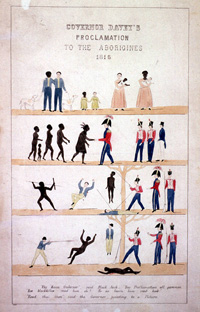Telling Places in Country (TPIC)
Kickerterpoller (Black Tom)
Aboriginal Life Stories - Robinson's Clan Guides

Better known in the colony as 'Black Tom', or Tom Birch, Kickerterpoller was taken by whitemen from the Paredarererme clan as a young boy. The Paredarererme clan belonged to the Oyster Bay nation whose area covered the coastal fringe from St Patrick's Head to the eastern edge of the Derwent River. Kickerterpoller was raised in the households of Mrs. Birch and Mrs. Hodgson respectively. He was baptised into the Christian faith and had spent time in the bush with armed roving parties who were searching for clanspeople. It seem likely that Kickerterpoller followed the trend of other captive clanspeople and returned to his people to support them when the war escalated towards the close of the 1820s.
According to Henry Melville, Kickerterpoller had spent some time in Hobart Town where he reportedly had discussions with Governor Arthur about the attacks on the colony by the clanspeople. Kickerterpoller argued that the atrocities committed by the clans were justified. He did not believe the proclamation by the governor that everyone, black and white, would receive equal treatment if they continued to commit murder and crimes. The message boards depicting punishment for such crimes were distributed throughout the 'settled' districts. These were considered as ridiculous by Kickerterpoller who was adamant that his clanspeople would not be able to understand the drawings.
Governor Arthur promised Kickerterpoller a whaleboat as a payment for helping Robinson to make contact with the clanspeople in the bush, but it seems that this promise was never honoured. He married one of Robinson's Aboriginal guides, Pagerly, who accompanied him on Robinson's expeditions around the island. When Robinson's 1832 expedition set out from Launceston to travel to the northwest coast, several of his guides were suffering from severe sickness. Kickerterpoller was one of three guides who became seriously ill and he was taken to a colonial homestead at Emu Bay to recuperate while Robinson and the rest of his troupe continued on their journey. He died from acute diarrhoea on 16 May 1832. Robinson received a letter from a Mr Cottrell who informed him that Kickerterpoller had been placed in a coffin and buried 'on a point' near the storehouse at Emu Bay. Cottrell noted that he had marked the gravesite by erecting a log fence around it. Kickerterpoller had been baptised (as a child) living with white people and he had therefore been given a Christian burial according to Cottrell. However, perhaps the greatest spiritual travesty overlooked in Kickerterpoller's burial was that he was to be interred in a 'foreign' country by strangers who had no relationship with him. As a clansman originally from the Oyster Bay nation his body should have been cremated and his ashes covered over or collected and used for healing and ceremonial rituals.
There is a transcript in the state archives that gives a detailed record of the discussions between Kickerterpoller and Governor Arthur. The record gives us not only an appreciation of Kickerterpoller's grasp of English written as he spoke, but also an assessment of his honesty and wit. Kickerterpoller had lived in both worlds and there is no doubt that he had witnessed the futile attempts made by the colonial authority at ending the war. He saw the cruel impacts Martial Law had inflicted upon the clanspeople and understood that there was little hope of achieving a fair outcome for his people.
